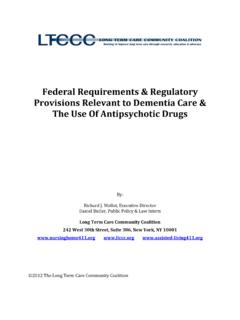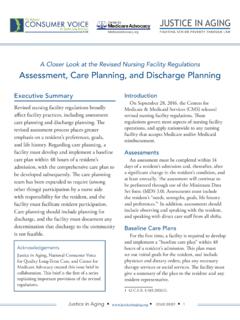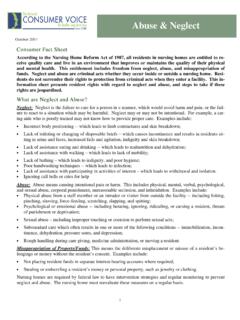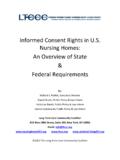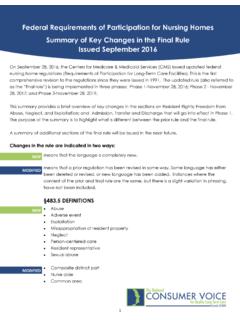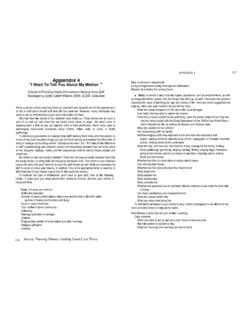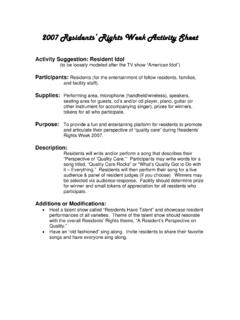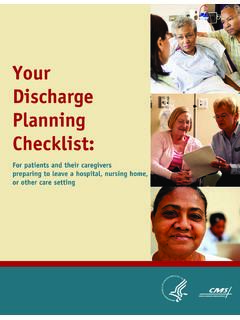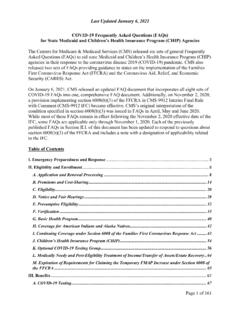Transcription of Click to read Federal Law and Regulations on Nurse ...
1 Click to read Federal Law and Regulations on Nurse Staffing Issues & Click to read Federal and State Minimum Staffing Requirements Federal Law and Regulations on Nurse Staffing Issues (as contained in the Nursing Home Reform Act of 1987) Each nursing home must provide 24-hour licensed nursing services which are sufficient to meet the nursing needs of each of its residents. Each nursing home must use the services of a registered professional Nurse for at least 8 consecutive hours a day, 7 days a week. Waivers of these standards are allowed as indicated below. If a waiver is granted, the State (under Medicaid) or the Secretary (under Medicare) must notify the long term care ombudsman and the facility must notify its residents and their immediate families. Medicaid Facilities: States may, on an annual basis, waive the nursing requirements to the extent a home cannot meet them if: A facility demonstrates to the satisfaction of the state that it has been unable, despite diligent efforts (including offering wages at the community prevailing rate for nursing facilities) to recruit appropriate personnel; The state determines that a waive will not endanger the health or safety of residents; The state finds that, for any periods in which licensed nursing services are not available, an or a physician is obligated to respond immediately to telephone calls from the facility; If the Secretary determines that a state shows a pattern and practice of allowing waivers in the absence of diligent efforts by facilities to meet staffing patterns, the Secretary must assume the state s authority to grant waivers.
2 A facility s reimbursement must be reduced to take into account the waivered facility s lowered costs. Medicare facilities: The Secretary may, on an annual basis, waive the requirement for a registered professional Nurse for more than 40 hours per week if the Secretary finds that: The facility is located in a rural area and the supply of skilled nursing facility services in the area that is not sufficient to meet the demand for such services ; The facility has a full-time registered Nurse regularly on duty 40 hours per week; The facility either: has only patients who do not require the services of a registered Nurse or physician for a 48-hour period, as documented by the physician, or has arranged for a registered or physician to spend time in the facility as necessary to provide needed services when the regular full-time registered Nurse is not on duty. The Law states that each facility is to "care for its residents in such a manner and in such an environment as will promote maintenance or enhancement of the quality of life of each resident.
3 The Law states that "A nursing facility must have sufficient nursing staff to provide nursing and related services to "attain or maintain the highest practicable physical, mental, and psychosocial well-being of each resident in accordance with a written plan of care." The Law states that professional staffing services are to be provided, which includes: - nursing services and specialized rehabilitative services, medically related social services; pharmaceutical, dietary, activities, dental, and treatment and services required by mentally ill and mentally retarded residents not otherwise provided or arranged for Note: Nursing services are needed to support and carry out the other professional services needed. And direct care workers, certified nursing assistants, are also critically needed to provide this support. The Law states that - all services provided or arranged by facility must be provided by qualified persons using professional standards of quality.
4 (including standards published by AMA, AMDA, ANA, NAAP, and NASW and clinical practice guidelines by Agency of HC Policy and Research) The Law states that Nurse aides must be trained, tested for competency, and must be Certified Nurse Aides (Certified Nursing Assistant CNA) - facility cannot use an aide on a full-time basis for more than 4 months unless the person has completed a 75 hour training and received and passed a "competency evaluation." - CNA s are put on a state registry that must be checked before hiring - Regular in-service training is required The Regulations provide a general outline of what is required for the 75-hour training course. Each states develops its own training program according to the outline. Note: There is little oversight of the quality of the training. HOW DO SURVEYORS/INSPECTORS DETERMINE SUFFICIENT NURSING STAFF: Determining Factors (according to HCFA Interpretative Guidelines) - the ability of the facility to provide needed care for residents.
5 - A deficiency concerning staffing should ordinarily provide examples of care deficits caused by insufficient quantity and quality of staff. - If however, inadequate staff (either the number or category) presents a clear threat to residents reaching their "highest practicable level of well-being surveyors are directed to cite this as a deficiency. - The surveyor is to develop specific documentation detailing what the threat is to residents. - The facility is required to designate an RN to serve as Director of Nursing on a full-time basis (at least 35 hours). This can be shared by more than one RN. [HCFA Interpretative Guidelines, Tag 353.] QUALITY OF CARE (per HCFA Interpretative Guidelines) includes care related to: -- activities of daily living -- vision and hearing -- prevention and care of pressure sores -- prevention and cure of urinary incontinence -- range of motion -- mental and psychosocial functioning -- naso-gastric tube care -- accidents -- nutrition -- hydration -- special needs (injections, parenteral and enteral fluids, colostomy, tracheostomy/suctioning, respiratory, foot care, prostheses, etc.)
6 -- medications, including attention to unnecessary drugs NATIONAL CITIZENS COALITION FOR NURSING HOME REFORM Federal & STATE MINIMUM STAFFING REQUIREMENTS December 1999 Adequate numbers of well-trained, well-supervised staff are critical to quality in long term care. The Nursing Home Reform Act of 1987 (Public Law 100-203) promised each nursing home resident that s/he had the right to expect care and services from the nursing home which would allow him/her to "attain or maintain his/her highest practicable level of physical, mental, and psychosocial functioning." Unfortunately, however, Congress did not go that extra step and require a specific minimum caregiver/resident ratio or a minimum standard setting out the number of hours per patient day that a resident should be receiving care. In 1990, Congress did require the Department of Health and Human Services to conduct a study and report to Congress by January 1, 1992 on the appropriateness of establishing minimum supervisor to caregiver to resident ratios and provide recommendations on such ratios.
7 Only now, in 1999, is that report being completed. The Department of Health and Human Services expects such a report and recommendation to be submitted to Congress in 2000. Until the Federal report was completed, the role of setting specific standards was left to the States to develop and implement. Most states have a specific minimum standard in state law, regulation, or policy. None of those state standards, however, meet the Consumer Minimum Staffing Standard a standard developed by nursing professionals with long term care expertise and adopted by the membership of the National Citizens Coalition for Nursing Home Reform (in 1995 and an updated version in 1998). The Consumer Minimum Staffing Standard requires, at the very least: FOR EVERY NURSING FACILITY: A full-time RN Director of Nursing A full-time RN Assistant Director of Nursing (in facilities of 100 beds or more) A full-time RN Director of In-service Education An RN nursing supervisor on duty at all times (24 hours, 7 days per week) Direct caregivers (RN, LPN, LVN, or CNA) Day 1:5 residents Evening 1:10 residents Night 1:15 residents PLUS Licensed nurses (RN, LPN, or LVN) Day 1:15 residents Evening 1:20 residents Night 1:30 residents [See complete copy of the NCCNHR Minimum Staffing Standards] In addition to NCCNHR, the NCCNHR Minimum Staffing Standards was endorsed by the 16 attendees at a small, invitational consensus conference on, Staffing, Case Mix and Quality, held by the prestigious John A.
8 Hartford Institute of Gerontological Nursing at New York University. The 1998 conference was supported in part by the Agency for Health Care Policy and Research, an agency of the Department of Health and Human Services. An article on the standard will be published in the Gerontologist (in Press). The issue of adequate staffing is becoming of greater interest to legislatures around the country. In the last year or two, approximately 2/3 of states have either promulgated a new law or regulation or ordered a committee to evaluate the information necessary to decide whether to set another (more appropriate) standard.

